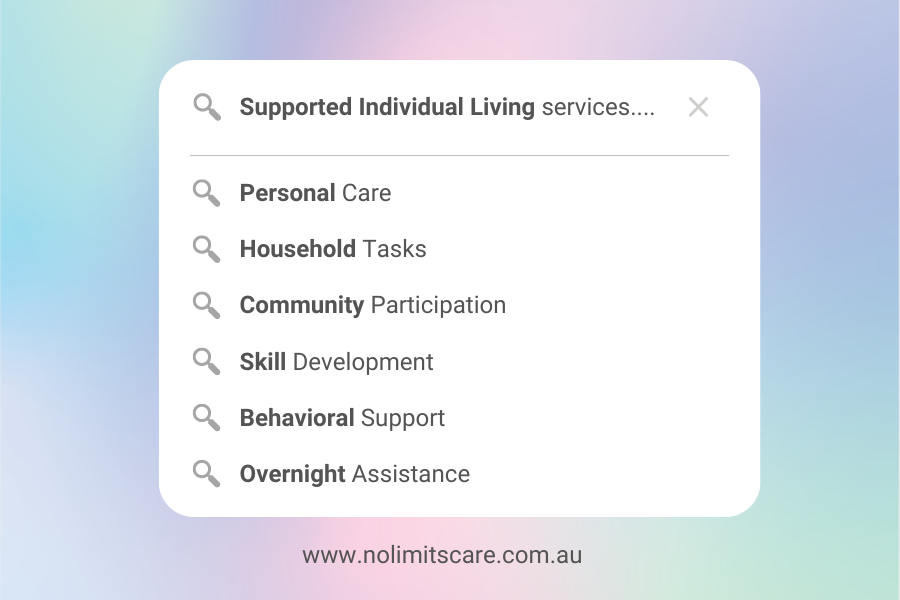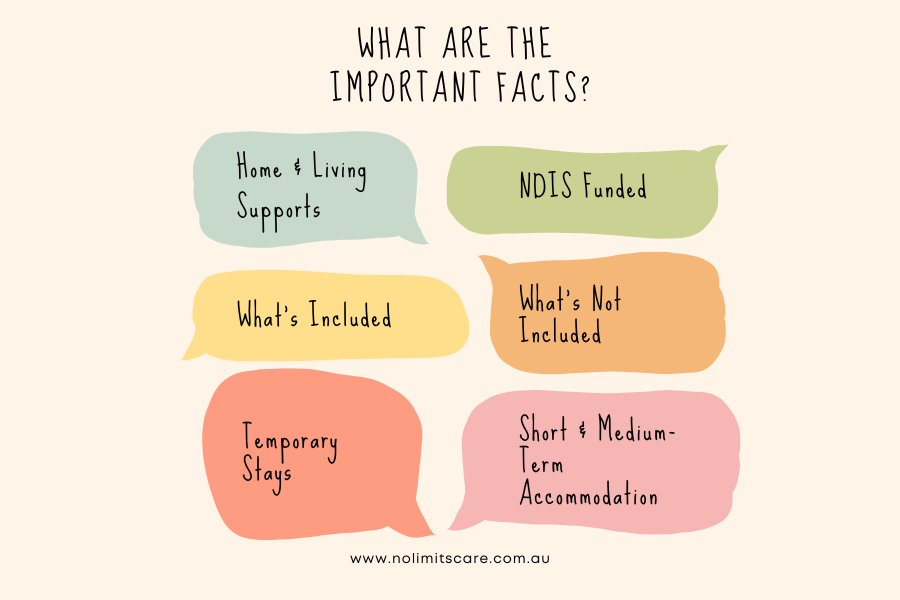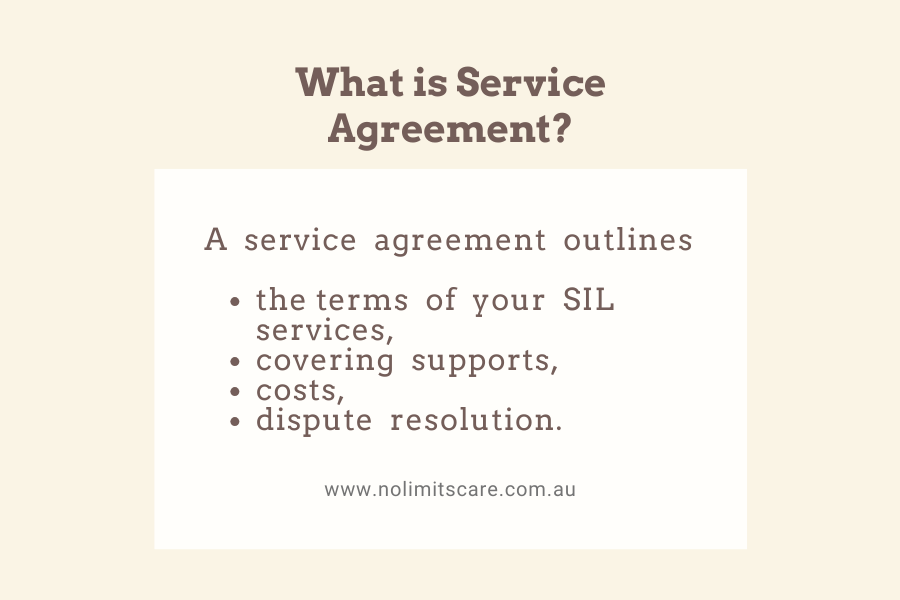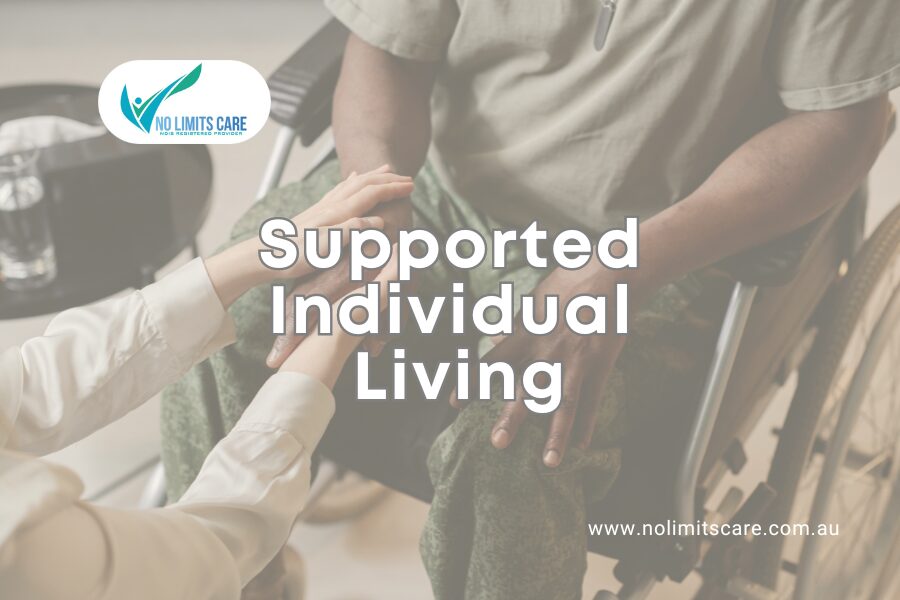Table of Contents
Supported Independent Living (SIL): Everything You Need to Know
What is Supported Independent Living (SIL)?
Supported independent living (SIL) refers to the NDIS support service that enables you to live independently in the comfort of your home, through day-to-day assistance. The service allows you to navigate through your disabilities.

The services it covers are as follows:
- Personal Care: Meal preparation, bathing, showering, etc.
- Household Tasks: Cleaning, laundry, grocery shopping, etc.
- Community Participation: Transportation training, community participation, etc.
- Skill Development: Life skills training, social skills development, etc.
- Behavioral Support: Behavioral plan execution, psychosocial preventive measures, etc.
- Overnight Assistance: Ensuring safety and security at night, other assistance, etc
The Supported Independent Living (SIL) Eligibility Criteria:
- Individuals should have high support needs.
- Individuals require 24/7 support at home to carry out their daily activities.
- In Supported Independent Living (SIL), participants would live with other SIL residents.
- Individuals must be 18 years or older and under 65 years of age.
- Individuals must be Australian citizens, permanent visa holders, or protected special category visa holders.
- The individuals must have a permanent impairment of some kind.
The NDIS officially funds SIL for every disabled individual who really needs it.
How Supported Independent Living (SIL) Works?
The objective of supported independent living (SIL) is to make you learn new skills and help you become independent.
According to the NDIS guide on SIL, “most participants who get SIL funding live with housemates who also have SIL funding”.
After passing the eligibility test, NDIS provides funds for Supported Independent Living (SIL) and connects you with a registered NDIA planner or a local area coordinator to assist you further. These professionals can help explain their respective roles in more detail. They will then connect you with either a support coordinator or a SIL provider. To directly connect with a SIL provider or a support coordinator, you can reach out to No Limits Care.
Once the process is underway, a care roster is established for SIL participants. Based on this, the SIL provider visits the participants’ homes to provide care. Typically, the SIL providers will be available in the morning, at noon, and stay overnight. Both the services and the plan are periodically reviewed.
Illustration 1
Alex used to reside with his parents. After securing SIL funding, he moved into his own home with another participant, Ben. Support workers regularly visit Alex and Ben to assist with tasks such as cooking, cleaning, chores, shopping, and social activities. These support workers arrive at various times throughout the day, including morning visits, afternoon visits, and overnight stays. Alex’s mother, Emily, remarks, “The NDIS has provided Alex with a wonderful opportunity to live independently away from home. He is capable of accomplishing so much when he sets his mind to it. The NDIS offers a fantastic platform for personal growth, enjoyment, and experiencing life to the fullest.”
Illustration 2
Sarah, a 29-year-old resident of Caboolture, cherishes her newfound independence living in a shared home with three peers. Sarah, who has an intellectual disability, thrives in her NDIS-supported lifestyle, enjoying activities like cooking classes, swimming, and social events. Her family is delighted to see her thriving in her shared living arrangement, where she has found a sense of belonging and camaraderie with her housemates

Supported Independent Living (SIL) Fund: Important Facts
The Supported Independent Living (SIL) fund is supported by the NDIS. The NDIA planner or the local support coordinator will first analyze your support needs and then advise you on whether you should opt for SIL support. Only after this assessment, you will be funded for SIL by the NDIS.
Note: This has always been a common ground of confusion. If you prefer to live independently in your own home instead of a SIL home, you may qualify for ‘Home and Living Supports’ funding. This is different from the SIL funding, which we will discuss later in this blog.
A SIL fund will include the following:
- Funding for a support coordination (subject to NDIS discretion).
- Funding for the SIL provider.
- Funding for your goals and aspirations.
- Funding for home modifications (e.g., safety rails, ramps, etc.).
- Funding for core SIL services (e.g., self-care, domestic help, etc.).
- Funding for short-term accommodation (1 day – 2 weeks).
- Funding for respite care.
- Funding for medium-term accommodation (2 weeks – 3 months).
- Funding for assistive technology (wheelchair, hearing aids, etc.).
A SIL fund will not include the following:
- Funding for your rent or home.
- Funding for finding you a home.
- Funding for your groceries.
Note: Please take note that Supported Independent Living Accommodation is only available for short-term and medium-term stays. For instance, if you need to stay elsewhere while home modifications are being made, you can choose the short-term accommodation service. If you are waiting to move into your new home, you can opt for the medium-term accommodation service.
Function of NDIA Planner, Local Area Coordinator, Support Coordinator & SIL Provider in Supported Independent Living (SIL)
NDIA Planner
The NDIA planner assists supported independent living (SIL) participants in creating their NDIS plan. They assess your support needs and determine if SIL is suitable for you based on factors such as your age, goals, independence level, and other available NDIS options. The allocation of the SIL fund is typically based on their assessment. The NDIA planner can also help connect you with a support coordinator or a SIL provider based on your specific requirements.
Local Area Coordinator
Unlike the NDIS planner, the Local Area Coordinator (LAC) assists any person with a disability in finding suitable support services, whether they fall under the NDIS or not. They can also assist in assessing the suitability of Supported Independent Living (SIL) services, similar to the NDIS planner.
Support Coordinator
- Locating SIL providers
- Finding other community services
- Assisting with the cost planning of SIL providers
- Finding best ways to use the SIL fund
SIL Provider
Supported Independent Living (SIL) providers offer essential SIL services according to a care roster. SIL participants typically sign a service agreement with the SIL provider. The provider helps participants with their day-to-day activities falling under SIL services, providing the necessary support and adjusting the plan based on the individual’s progress. Feel free to reach out to No Limits Care for SIL providers, as we have the best SIL providers in Melbourne.
Support Options other than Supported Independent Living (SIL)
Home and Living Supports
As mentioned earlier, home and living supports are for individuals who choose to stay in the comfort of their own home rather than in one of the SIL homes. This is a NDIS-supported scheme for the disabled, and it is decided based on your goals and aspirations.
Specialist Disability Accommodation (SDA)
According to the NDIS guide, “Specialist Disability Accommodation is housing designed for people with very high support needs. SIL funding is also included in this category”. The SDA funds, just like the SIL funds, are eligible for home modifications, assistive technology, etc
Individualised Living Options (ILO)
Individualized living options are funded by the NDIS. This service allows disabled individuals to receive assisted living homes services in their own homes, without the need to share their living space with other NDIS participants. However, unlike home and living supports, individuals cannot stay in their own homes while receiving this service. Instead, they will be provided with a different NDIS-supported home.
Contact No Limits Care for Supported Independent Living (SIL) in Melbourne!
Do not hesitate to contact No Limits Care for Supported Independent Living (SIL) services in Melbourne. We believe in making Supported Independent Living (SIL) a positive experience by supporting your capacity-building journey and helping you maintain and develop independence skills. No Limits Care offers trusted SIL services through the NDIS, supporting you to live as independently as possible in your own home or in homes managed by us. Our specialized staff provide high-quality services tailored to your needs and goals. We are expanding and have numerous accessible homes available to suit your needs.
User FAQs on Supported Independent Living (SIL)

A detailed schedule created by your SIL provider to outline the specific supports you need throughout the week. It is broken down into 30-minute blocks, helping determine the necessary funding for your SIL services.
A service agreement is a formal document outlining the terms and conditions of the services you will receive from your SIL service provider. It includes details such as the specific supports, delivery methods, costs, duration of the agreement, modification procedures, and dispute resolution mechanisms. While not mandatory, a service agreement can provide clarity and protection for you and your service provider
To request changes to your service agreement, you can directly discuss your concerns with your service provider or seek help from a friend or family member to review the agreement. Remember, open communication with your service provider is key to ensuring the agreement meets your needs.
If you are unhappy with the support you receive from SIL, it is important to directly communicate your concerns to your service provider. Discuss both positive aspects and areas needing improvement. Ask for necessary changes and seek assistance from your Support Coordinator or other trusted individuals (i.e., friends or family).
Contact NDIS Quality and Safeguards Commission (Ph: 1800 035 544) if you’re feeling unsafe and unhappy with the support service.
Fraud can occur in various ways. Common indicators include unnecessary charges, false claims, bribery, and identity theft. If you notice any of these signs, report the suspected fraud to the NDIS Fraud Reporting Hotline.
Here are some major contacts for the Supported Independent Living (SIL) service under NDIS:
- NDIS Quality and Safeguards Commission: 1800 035 544
- NDIS Fraud Reporting Hotline: 1800 650 717
- Additional Supported Independent Living (SIL) Helpline: 1800 800 110
- Translating and Interpreting Service (TIS): 131 450
- TTY: 1800 555 677
- Speak and Listen: 1800 555 727
- National Relay Service: 133 677



